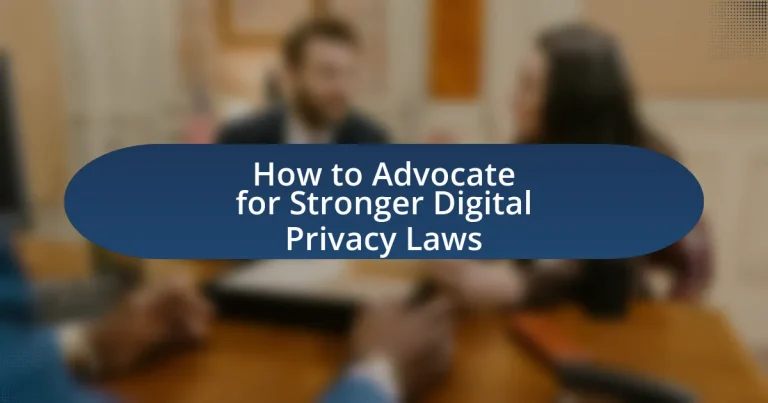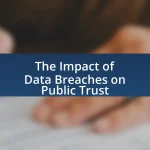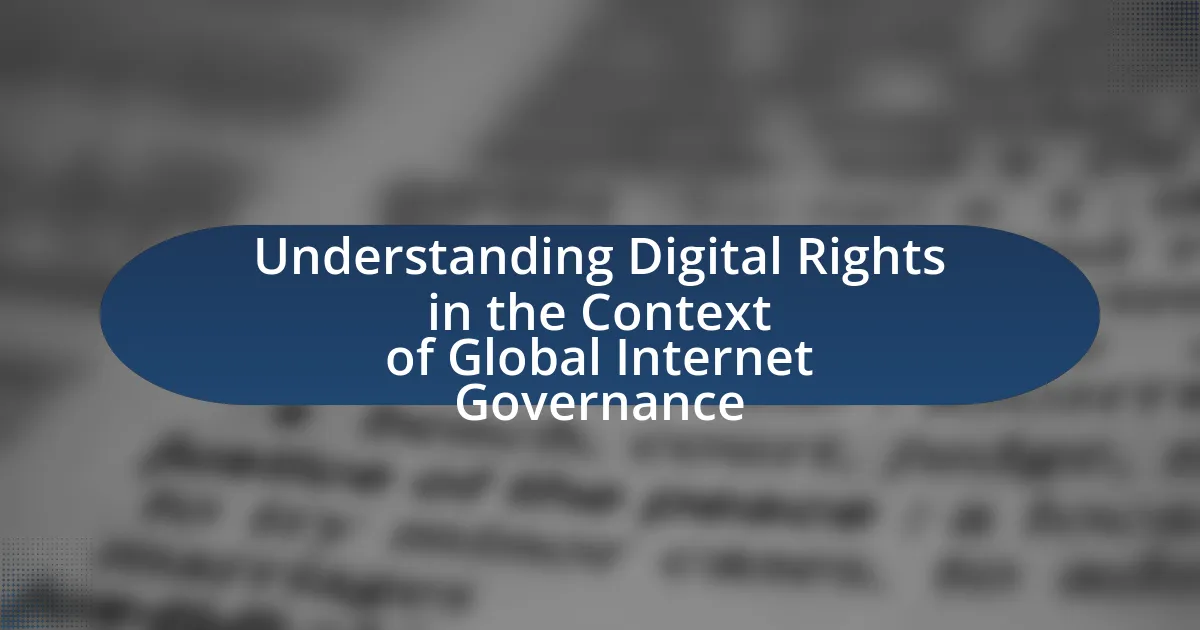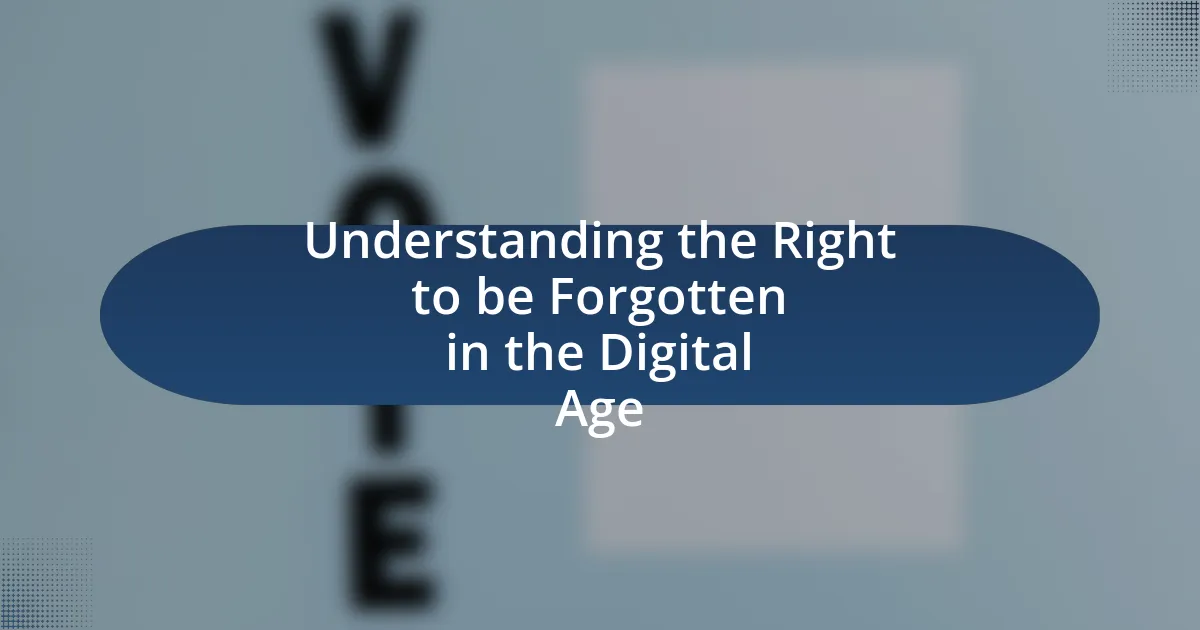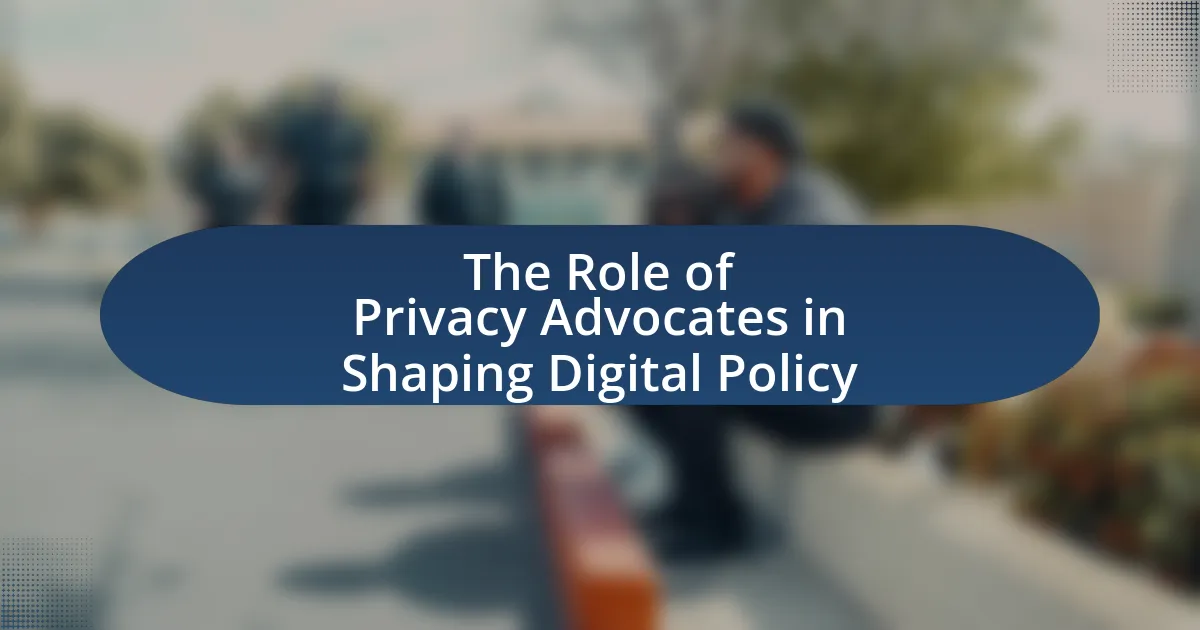Digital privacy laws are essential regulations that protect individuals’ personal information in the digital landscape, ensuring responsible data handling by organizations. This article outlines the significance of these laws, such as the General Data Protection Regulation (GDPR), and details the rights individuals possess under them, including access, correction, and deletion of personal data. It also addresses the challenges faced in enforcing these laws, the role of advocacy groups in shaping legislation, and practical steps individuals can take to advocate for stronger protections. Additionally, it highlights resources available for advocacy and the importance of community engagement in promoting digital privacy awareness.
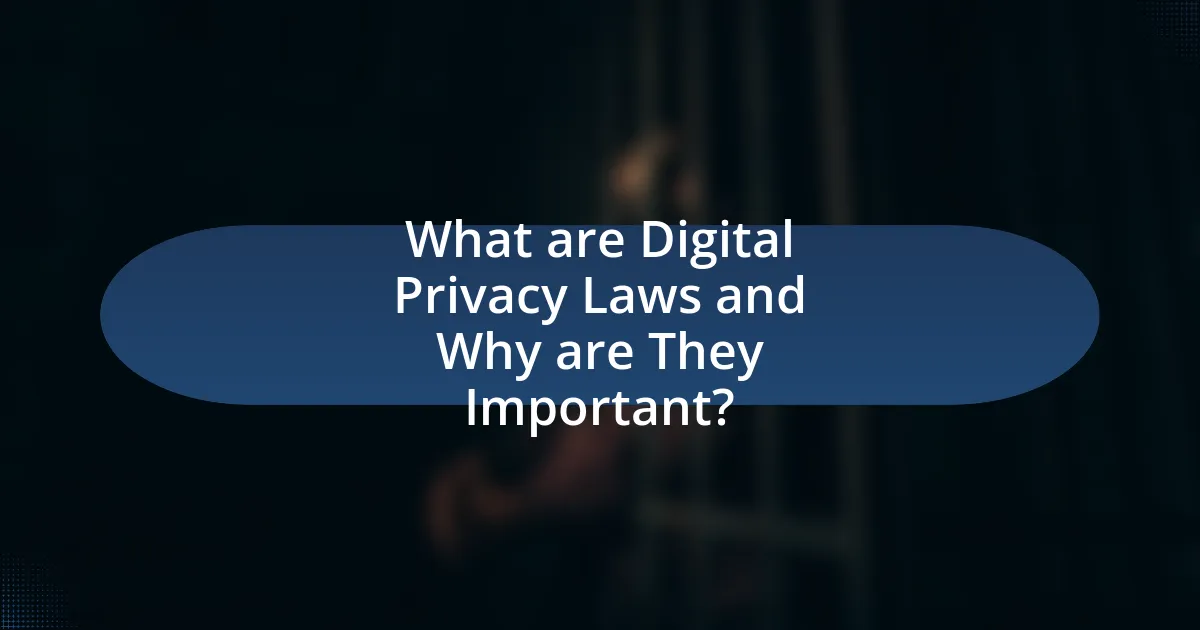
What are Digital Privacy Laws and Why are They Important?
Digital privacy laws are regulations that govern the collection, use, and protection of personal information in the digital realm. These laws are important because they safeguard individuals’ rights to privacy, ensuring that their personal data is handled responsibly and securely by organizations. For instance, the General Data Protection Regulation (GDPR) in the European Union imposes strict guidelines on data processing and grants individuals greater control over their personal information, reflecting a growing recognition of the need for robust privacy protections in an increasingly digital world.
How do Digital Privacy Laws protect individuals?
Digital privacy laws protect individuals by establishing regulations that govern the collection, use, and sharing of personal data by organizations. These laws, such as the General Data Protection Regulation (GDPR) in the European Union, grant individuals rights over their personal information, including the right to access, correct, and delete their data. For instance, GDPR mandates that organizations must obtain explicit consent from individuals before processing their data, ensuring that individuals have control over their personal information. Additionally, these laws impose penalties on organizations that fail to comply, thereby incentivizing them to prioritize data protection and privacy.
What rights do individuals have under these laws?
Individuals have the right to access their personal data, control its use, and seek redress for violations under digital privacy laws. These rights typically include the right to know what data is collected, the right to request deletion of personal information, and the right to consent to data processing. For instance, the General Data Protection Regulation (GDPR) in the European Union grants individuals these rights, ensuring they can manage their personal information effectively and hold organizations accountable for misuse.
How do these laws impact data collection practices?
Laws governing digital privacy significantly restrict data collection practices by imposing stringent requirements on consent and transparency. These regulations, such as the General Data Protection Regulation (GDPR) in Europe, mandate that organizations obtain explicit consent from individuals before collecting their personal data. Furthermore, these laws require companies to clearly inform users about how their data will be used, stored, and shared, thereby enhancing accountability. For instance, under GDPR, organizations face substantial fines for non-compliance, which incentivizes adherence to these privacy standards and ultimately leads to more responsible data handling practices.
What are the current challenges in Digital Privacy Laws?
Current challenges in digital privacy laws include the rapid pace of technological advancement, which often outstrips legislative processes, leading to outdated regulations. Additionally, there is a lack of uniformity in privacy laws across jurisdictions, creating confusion for businesses and consumers alike. For instance, the General Data Protection Regulation (GDPR) in Europe contrasts sharply with the more fragmented approach seen in the United States, where states like California have their own laws. Furthermore, enforcement of existing laws is often weak, with limited resources allocated to regulatory bodies, resulting in inadequate protection for individuals. These challenges hinder effective advocacy for stronger digital privacy laws.
Why are existing laws often insufficient?
Existing laws are often insufficient due to their inability to keep pace with rapid technological advancements and evolving digital landscapes. For instance, many privacy laws were enacted before the rise of social media and big data analytics, leading to gaps in protection against modern threats such as data breaches and unauthorized surveillance. Additionally, existing regulations may lack enforcement mechanisms, resulting in minimal accountability for violations. A study by the Electronic Frontier Foundation highlights that outdated legal frameworks fail to address the complexities of data ownership and user consent, further underscoring the need for stronger, more adaptive privacy laws.
How do technological advancements complicate privacy regulations?
Technological advancements complicate privacy regulations by introducing new data collection methods and increasing the volume of personal data generated. For instance, the rise of artificial intelligence and machine learning enables companies to analyze vast amounts of data in real-time, often without explicit consent from individuals. This rapid evolution outpaces existing legal frameworks, making it difficult for regulators to enforce privacy protections effectively. Additionally, technologies such as blockchain and the Internet of Things create complex data ecosystems that challenge traditional notions of data ownership and control, further complicating regulatory efforts.
What role do advocacy groups play in shaping Digital Privacy Laws?
Advocacy groups play a crucial role in shaping Digital Privacy Laws by influencing policy decisions and raising public awareness about privacy issues. These organizations engage in lobbying efforts, providing expert testimony, and mobilizing grassroots campaigns to advocate for stronger protections against data misuse and surveillance. For instance, groups like the Electronic Frontier Foundation have successfully campaigned for legislation such as the California Consumer Privacy Act, which enhances consumer rights regarding personal data. Their efforts often include conducting research, publishing reports, and collaborating with lawmakers to draft effective legislation, thereby ensuring that the voices of consumers are represented in the legal framework governing digital privacy.
How can individuals get involved with these groups?
Individuals can get involved with groups advocating for stronger digital privacy laws by joining organizations focused on digital rights, participating in local advocacy events, and engaging in online campaigns. Many organizations, such as the Electronic Frontier Foundation and the American Civil Liberties Union, offer membership options that provide resources and opportunities for activism. Additionally, individuals can attend workshops, webinars, and community meetings to learn more about digital privacy issues and connect with like-minded advocates. Engaging in social media campaigns and signing petitions related to digital privacy legislation also amplifies their voices and supports the cause.
What strategies do advocacy groups use to influence legislation?
Advocacy groups use several strategies to influence legislation, including lobbying, grassroots mobilization, public awareness campaigns, and coalition building. Lobbying involves direct interaction with lawmakers to persuade them to support specific legislation, often backed by research and expert testimony. Grassroots mobilization engages the public to contact their representatives, demonstrating widespread support for an issue, which can sway legislative decisions. Public awareness campaigns utilize media and social platforms to educate the public and lawmakers about the importance of specific legislation, thereby creating a favorable environment for change. Coalition building brings together various organizations and stakeholders to present a united front, amplifying their influence and resources in advocating for stronger digital privacy laws. These strategies are effective as they leverage both direct and indirect methods to create pressure on legislators to act in favor of the advocacy group’s goals.
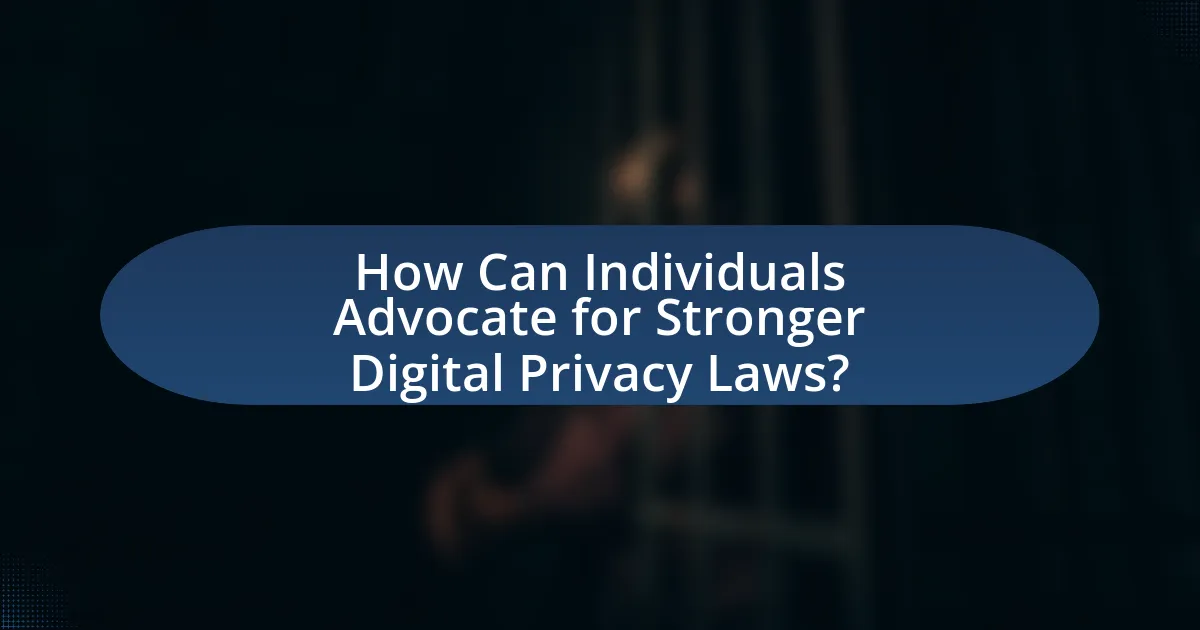
How Can Individuals Advocate for Stronger Digital Privacy Laws?
Individuals can advocate for stronger digital privacy laws by engaging in grassroots activism, contacting legislators, and participating in public discussions. Grassroots activism involves organizing or joining campaigns that raise awareness about digital privacy issues, which can mobilize community support and influence policymakers. Contacting legislators directly through emails, calls, or meetings allows individuals to express their concerns and urge for specific legislative changes. Additionally, participating in public discussions, such as town hall meetings or online forums, helps to amplify the conversation around digital privacy and encourages others to join the advocacy efforts. According to a 2021 survey by the Pew Research Center, 79% of Americans expressed concern about how their data is used by companies, indicating a strong public interest in advocating for enhanced privacy protections.
What steps can individuals take to raise awareness?
Individuals can raise awareness about stronger digital privacy laws by engaging in community education initiatives. This can include organizing workshops, seminars, or online webinars that inform the public about the importance of digital privacy and current legislative gaps. Research indicates that informed communities are more likely to advocate for policy changes, as seen in the 2018 Cambridge Analytica scandal, which heightened public awareness and led to increased calls for regulatory reforms. Additionally, individuals can utilize social media platforms to share informative content, thereby reaching a broader audience and fostering discussions around digital privacy issues.
How can social media be utilized for advocacy?
Social media can be utilized for advocacy by raising awareness, mobilizing supporters, and facilitating communication around issues like digital privacy laws. Platforms such as Twitter, Facebook, and Instagram allow advocates to share information, engage with followers, and create campaigns that highlight the importance of stronger privacy protections. For instance, the #PrivacyMatters campaign on Twitter successfully garnered over 100,000 tweets, demonstrating the power of social media in amplifying messages and rallying public support for legislative changes.
What are effective ways to communicate with lawmakers?
Effective ways to communicate with lawmakers include direct engagement through meetings, written correspondence, and public testimony. Direct meetings allow constituents to present their views and concerns face-to-face, fostering a personal connection. Written correspondence, such as letters or emails, provides lawmakers with clear, concise information and can be easily referenced. Public testimony during hearings enables advocates to share their perspectives in a formal setting, influencing legislative discussions. Research indicates that personal stories and data-driven arguments significantly impact lawmakers’ decisions, as they resonate with their constituents’ experiences and highlight the importance of issues like digital privacy.
Why is grassroots organizing important in this context?
Grassroots organizing is crucial in advocating for stronger digital privacy laws because it mobilizes community members to collectively voice their concerns and influence policy change. This approach empowers individuals to engage directly with lawmakers, ensuring that the voices of those affected by privacy issues are heard. Historical examples, such as the successful campaigns for data protection regulations in various countries, demonstrate that grassroots movements can effectively raise awareness and pressure legislators to act. By fostering a sense of community and shared purpose, grassroots organizing amplifies the demand for robust digital privacy protections, making it a vital strategy in this context.
How can community events promote digital privacy awareness?
Community events can promote digital privacy awareness by providing educational workshops and discussions that inform participants about privacy risks and protective measures. These events create a platform for experts to share knowledge on topics such as data protection, online security, and the implications of privacy laws. For instance, a study by the Pew Research Center found that 79% of Americans are concerned about how their data is being used, highlighting the need for increased awareness. By engaging community members in interactive sessions, events can foster a deeper understanding of digital privacy issues and encourage proactive behaviors, such as using encryption tools and understanding privacy settings on social media.
What role does education play in advocacy efforts?
Education plays a crucial role in advocacy efforts by equipping individuals with the knowledge and skills necessary to effectively promote their causes. It enhances understanding of complex issues, such as digital privacy laws, enabling advocates to articulate their positions clearly and persuasively. For instance, research from the Pew Research Center indicates that informed citizens are more likely to engage in advocacy activities, demonstrating that education fosters civic participation and empowers individuals to influence policy decisions.
What are the best practices for effective advocacy?
The best practices for effective advocacy include clear messaging, building coalitions, and engaging with stakeholders. Clear messaging ensures that the advocacy goals are communicated succinctly and effectively, which is crucial for garnering support. Building coalitions with like-minded organizations amplifies the advocacy efforts and increases influence, as demonstrated by successful campaigns like the coalition for the General Data Protection Regulation (GDPR) in Europe. Engaging with stakeholders, including policymakers and the public, fosters dialogue and understanding, which is essential for creating impactful change in digital privacy laws.
How can individuals measure the impact of their advocacy efforts?
Individuals can measure the impact of their advocacy efforts by tracking specific metrics such as changes in policy, public awareness, and engagement levels. For instance, they can analyze the number of signatures collected on petitions, attendance at advocacy events, or social media engagement metrics like shares and comments. Additionally, monitoring legislative changes or responses from policymakers can provide concrete evidence of influence. Research indicates that advocacy campaigns that utilize data analytics to assess these factors can demonstrate a direct correlation between their efforts and tangible outcomes, such as the passage of new privacy laws or amendments to existing legislation.
What common mistakes should advocates avoid?
Advocates should avoid common mistakes such as failing to understand the legal framework surrounding digital privacy, neglecting to engage with stakeholders, and not utilizing data effectively. Understanding the legal context is crucial because it informs the advocacy strategy and ensures compliance with existing laws. Engaging with stakeholders, including policymakers and the public, is essential for building support and fostering collaboration. Additionally, utilizing data effectively, such as presenting statistics on privacy breaches or public opinion, strengthens arguments and enhances credibility. These mistakes can undermine advocacy efforts and hinder the push for stronger digital privacy laws.
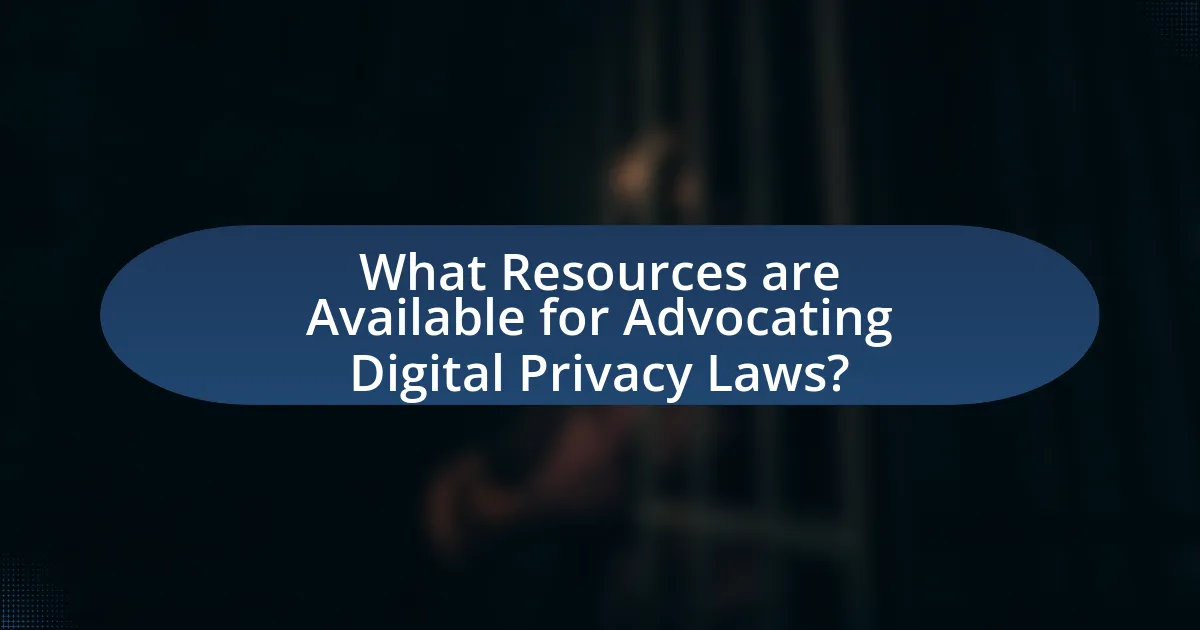
What Resources are Available for Advocating Digital Privacy Laws?
Advocating for digital privacy laws can be supported by various resources, including non-profit organizations, legal frameworks, and educational materials. Organizations such as the Electronic Frontier Foundation (EFF) and the American Civil Liberties Union (ACLU) provide extensive resources, including research papers, toolkits, and advocacy guides that help individuals and groups understand and promote digital privacy rights. Additionally, legislative resources like the General Data Protection Regulation (GDPR) and the California Consumer Privacy Act (CCPA) serve as frameworks for understanding privacy laws and advocating for stronger protections. Educational resources, including webinars, workshops, and online courses, are also available through platforms like Coursera and edX, which offer insights into digital privacy issues and advocacy strategies. These resources collectively empower advocates to effectively engage in the promotion of digital privacy laws.
What organizations provide support for digital privacy advocacy?
Organizations that provide support for digital privacy advocacy include the Electronic Frontier Foundation (EFF), the American Civil Liberties Union (ACLU), and Privacy International. The EFF focuses on defending civil liberties in the digital world, advocating for user privacy, and challenging government surveillance. The ACLU works to protect individual rights and liberties, including digital privacy, through litigation and public education. Privacy International campaigns against government surveillance and promotes privacy as a fundamental human right. These organizations are recognized for their significant contributions to the field of digital privacy advocacy.
How can individuals access educational materials from these organizations?
Individuals can access educational materials from organizations advocating for stronger digital privacy laws through their official websites, which typically offer resources such as reports, guides, webinars, and newsletters. For example, organizations like the Electronic Frontier Foundation and the American Civil Liberties Union provide downloadable content and online courses that educate the public on digital privacy issues. Additionally, many of these organizations host events and workshops that are open to the public, allowing individuals to engage directly with experts and access a wealth of information.
What tools are available for tracking legislation related to digital privacy?
Several tools are available for tracking legislation related to digital privacy, including GovTrack, LegiScan, and the National Conference of State Legislatures (NCSL) website. GovTrack allows users to monitor bills and legislative activities at the federal level, providing updates on digital privacy legislation. LegiScan offers a comprehensive database for tracking state-level legislation across the United States, including digital privacy laws. The NCSL website provides resources and reports on state legislative trends, including those related to digital privacy. These tools are widely used by advocates and organizations to stay informed about changes and developments in digital privacy legislation.
How can individuals stay informed about changes in digital privacy laws?
Individuals can stay informed about changes in digital privacy laws by subscribing to reputable legal and technology news outlets, following relevant government agencies, and joining advocacy organizations focused on digital rights. Reputable sources such as the Electronic Frontier Foundation and the International Association of Privacy Professionals provide updates and analyses on legislative changes. Additionally, government websites often publish information on new laws and regulations, while newsletters from advocacy groups can offer insights and alerts on significant developments in digital privacy legislation.
What are the best sources for news and updates on digital privacy issues?
The best sources for news and updates on digital privacy issues include reputable organizations and platforms such as the Electronic Frontier Foundation (EFF), Privacy International, and the Center for Democracy & Technology (CDT). These organizations provide comprehensive analyses, reports, and updates on legislative changes and privacy-related news. For instance, the EFF regularly publishes articles and blog posts that cover current digital privacy challenges and advocacy efforts, making it a reliable source for staying informed. Additionally, mainstream media outlets like The Guardian and Wired often feature dedicated sections on technology and privacy, offering timely reporting on significant developments in the field.
How can newsletters and blogs contribute to ongoing education?
Newsletters and blogs contribute to ongoing education by providing timely, relevant information and insights on current issues, such as digital privacy laws. These platforms facilitate continuous learning by regularly updating readers on new developments, research findings, and expert opinions, which enhances understanding and awareness. For instance, a blog post discussing recent changes in digital privacy regulations can inform readers about their rights and responsibilities, thereby fostering informed advocacy. Additionally, newsletters often curate resources and articles that help individuals stay engaged with evolving topics, making them essential tools for lifelong learning in a rapidly changing digital landscape.
What practical tips can individuals follow to enhance their advocacy efforts?
Individuals can enhance their advocacy efforts by educating themselves on digital privacy issues and engaging with their communities. Understanding the nuances of digital privacy laws, such as the General Data Protection Regulation (GDPR) and the California Consumer Privacy Act (CCPA), equips advocates with the knowledge needed to effectively communicate their concerns. Engaging with local organizations focused on digital rights can amplify their voice and provide networking opportunities. Additionally, utilizing social media platforms to raise awareness and share informative content can mobilize support and foster community discussions. Research indicates that grassroots movements, such as those seen in the push for stronger privacy regulations, often gain traction through community engagement and informed advocacy efforts.
